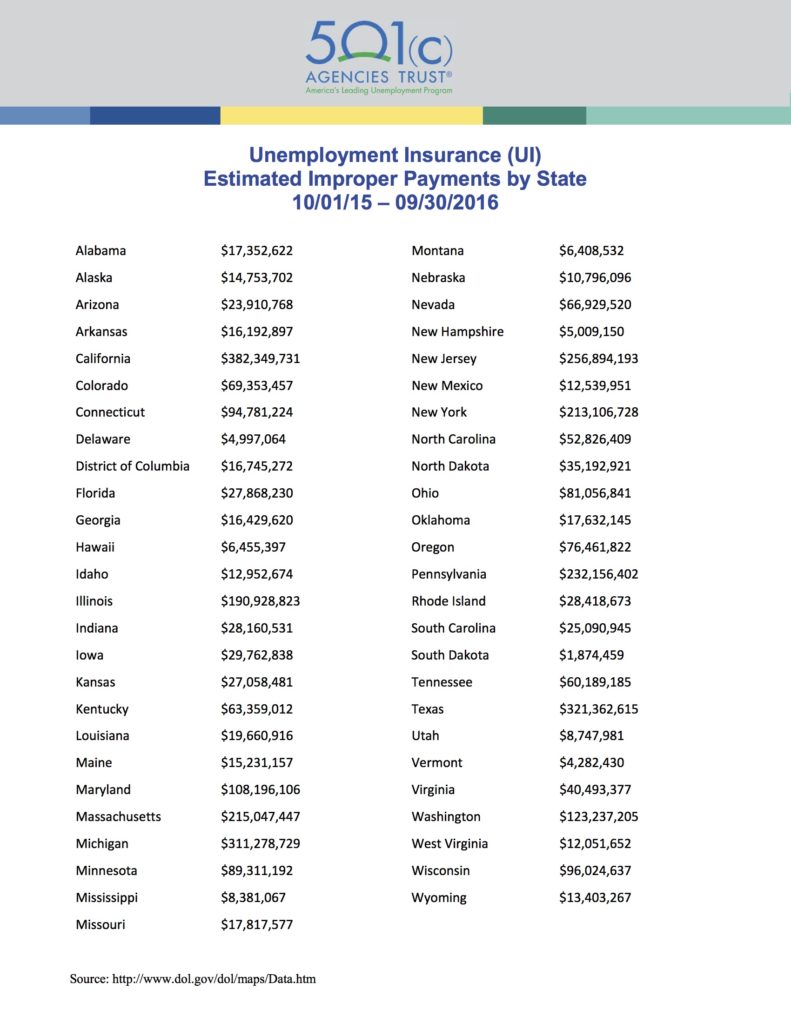
Government bureaucracies make mistakes because people make mistakes. It is not because anybody is malicious or lazy, but often times because people are overworked and overwhelmed. One problem all state unemployment insurance programs have is controlling and reducing improper payments. Improper payments are over-payments of benefits, and they also are qualified as claims that should have been paid but were disqualified instead. Audits of these systems often show that claimants get the incorrect amount of benefits; are receiving benefits for either too long or too short; and, at times, claimants are receiving benefits and should not be. Who is checking these government entities? In the case of 501(c) Agencies Trust members, we’re checking the state and getting dollars back for our members.
Unfortunately, for some states, the Department of Labor (DOL) audits state programs and reports on the extent to which unemployment insurance benefits were improperly paid by each state. Amazingly, most states overpay more than they underpay. No restitution is available to for-profit employers. They just lose. That’s not the case for nonprofit organizations that have opted out of the state unemployment insurance program and work with us at 501(c) Agencies Trust. The problem of improper payments is exacerbated for organizations that operate in multiple states. No two states do things exactly the same. Each state has its own unemployment program and laws governing these programs differ as well. Checking up on one government agency is difficult, doing so nation-wide is nearly impossible. There’s no replacing being able to audit the state effectively and extract restitution but understanding the root causes of most improper payments is important too.
The situations that contribute to or cause improper payments are well known. The fact that this continues to be a problem is totally infuriating, particularly to organizations that work to control unemployment claims as best as possible. Below are the top causes of improper payments according to the DOL:
- Benefit Year Earnings — The claimant continues to claim and receive benefits after returning to work.
- Separation Issues— Information regarding the claimant’s separation from work is received after a claim is paid that disqualifies the claimant from being eligible for benefits and creates an over-payment (employer sends inaccurate or late information or a ruling is made on appeal).
- Employment Service Registration — The claimant is not registered with the state’s Employment Service or job bank as required by state statute, disqualifying the claimant from being eligible for benefits.
- Work Search Issues — Inability to validate that the individual has met the state’s work search requirements, which disqualifies the claimant from being eligible for benefits.
- Able & Available Issues — The claimant is later determined to be unable or unavailable for work (in the hospital, in jail, etc.), disqualifying the claimant from being eligible for benefits.
- Dependent Issues — Erroneous reporting/recording of dependents’ information.
- Severance Pay, Vacation Pay, Social Security, Pension, Income from Other than Wages, and Other — The claimant receives income from sources other than wages while they claim benefits and fails to properly report this income. This also includes back pay awards, payment during a period of disqualification, or re-determination.
- Base Period Wage Issues — It is later determined that the claimant’s base period wages were over-reported (due to employer error or an automation error), and the claimant is determined to be eligible for fewer benefits than they have received.
501(c)(3) Nonprofits Can Get Out & Get Control
The problem of improper payments worries many employers, especially those that have been burned in the past. Nonprofits can’t afford to get roasted by the state and need every available resource to make it happen and serve their community. We help 501(c)(3) nonprofits opt out of state unemployment insurance programs and manage the risk and reward themselves. We give our members more pennies to pinch.
And problems, like improper unemployment benefits payments, evaporate. Organizations that partner with programs like ours – 501(c) Agencies Trust – enjoy the benefit of a committed advocate that has the tools needed to not only identify errors but rectify them.
We typically identify more than $1.3 million in state claims billing errors annually for our member organizations! We not only help organizations leave the state program and become reimbursing employers, but we also help them identify bureaucratic errors.
Contact us today for more information concerning the rights that are available to you now as a 501(c)(3) nonprofit. Money is mission. Together we can own it.




